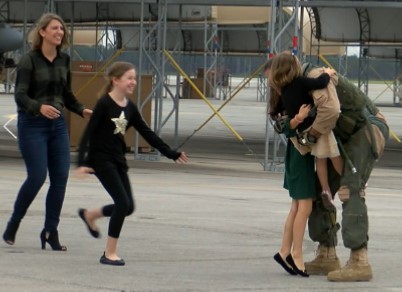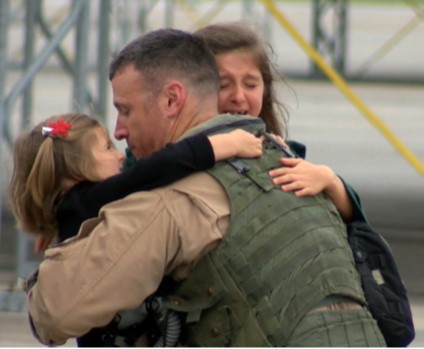
Lt. Col. Andrew Rundle graduated from the Naval Academy in May 2000 and was commissioned a 2nd LT in the Marine Corps. Following TBS, he entered Flight School and was designated a Naval Flight Officer in June 2002. He was assigned to Electronic Attack Squadron One Two Nine (VAQ-129) aboard Naval Air Station Whidbey Island, WA for training in the EA-6B. In October 2003, he reported to Marine Tactical Electronic Warfare Squadron One (VMAQ-1) aboard Marine Corps Air Station Cherry Point, NC and deployed in 2004 to Iwakuni, Japan as part of the Unit Deployment Program. In 2005 Captain Rundle deployed to Al Asad, Iraq in support of Operation IRAQI FREEDOM (OIF). Captain Rundle completed the Naval Postgraduate School Executive Masters of Business Administration (EMBA) program and earned his EMBA in the spring of 2010. He attended the Command and Staff College in Quantico, VA and graduated in 2011 with a Masters of Military Studies. In June 2011 Major Rundle reported to Marine Corps Air Station Cherry Point and returned to VMAQ-1 where he deployed to Aviano, Italy in support of Operation UNIFIED PROTECTOR en route to Bagram Airbase, Afghanistan in support of Operation ENDURING FREEDOM until April 2012. Selected for command of Marine Tactical Electronic Warfare Squadron Two (VMAQ-2), Major Rundle reported to MAG-14 in January 2017 in order to assume his duties. He was promoted early to Lt. Col. in July 2017.
The EA-6B Prowler has been at the forefront of military electronic warfare for more than 40 years, allowing high-profile air combat missions to be successful from every aerial battlefield since Vietnam. When the U.S. Navy retired their Prowler fleet in 2015, the Prowler’s legacy and final chapter was entrusted to the Marine Corps’ four tactical electronic warfare squadrons or VMAQs. That final chapter was written as VMAQ-2, the last Marine Prowler squadron and commanded by Lt. Col. Rundle, completed its final 8 month deployment in Qatar with the last six aircraft in the U.S. military inventory. Those aircraft maintained a high-operational tempo supporting Operation Resolute Support and Freedom’s Sentinel in Afghanistan as well as Operation Inherent Resolve.
“To be able to be part of this last squadron and this last deployment and send it out with class is a humbling privilege,” said Lt. Col. Andrew Rundle, VMAQ-2 Commanding Officer, who started flying the Prowler out of flight school in 2003. “We do our job, we take them home and then we put it to bed the right way – not only for ourselves – but everybody else that flew this and worked on it before us. A combat deployment for final deployment was a good way to send off the platform, especially for all the history within the community and the work that it’s done.”
"This is the end for a lot of us. Once the end of this year comes and we send down the aircraft, it's the last time we'll fly so it's bittersweet. But we do have a lot of talented Marines that are going to go on and do other things, that are transitioning to work on the F-35. We've got a couple that are gonna go fly the F-35, fly Hornets and things like that; so Prowler guys will still be around," said VMAQ-2 Commanding Officer Andrew Rundle. The Prowlers will mostly be replaced by the F-35 B.

The best part of returning from an 8 month deployment is of course the family reunions. Family members of the returning Marines anxiously awaited their arrival at the air station. The planes arrived around 2 p.m., and emotional reunions with partners and children soon followed. “It’s exciting. It’s always exciting, whether these deployments are six weeks long or almost eight months long, those reunions are special for all the families, the kids, the parents that come into town for these,” Stephanie Rundle said. “It definitely brings a tear to your eye, it doesn’t matter how many times you’ve seen it, it will always be special.” Stephanie Rundle, left, along with daughters, Payton, Emma and Ansley, greet their father, Commanding Officer Lt. Col. Andrew Rundle, at Marine Corps Air Station Cherry Point following his return from deployment. Stephanie Rundle said "it is difficult for the family when her husband is away on deployment" – this was Lt. Col. Rundle’s fifth – "but the reunions are always sweet."

Lt. Col. Rundle said the VMAQ-2 members will go on to various new roles once the squadron is deactivated. He said some plan to stay in the Marine Corps and receive new assignments, while others will retire from the military. The Cherry Point air station will host a sundown ceremony next spring once the planes have been officially retired and the squadron deactivated. “We should have a pretty good ceremony for that, a deactivation to send the airplane and the community off with a good note,” he said. “Then we’re just going to be working on getting folks set up with wherever they’re going to go next. In the meantime, Lt. Col. Rundle said he is focused on getting the rest of the VMAQ-2 squadron back in North Carolina and set up well for whatever path they end up taking moving forward. “If they’re going to a new chapter outside of the Marine Corps and go on to do other things, or if they’re going to stay in the Marine Corps and transition to something else… That’s where we’re going to be focused once we get everybody home, is making sure we’ll all step up on the right foot.” Lt. Col. Rundle was awarded the Bronze Star for his superior performance, leadership and management of VMAQ-2 during it's final deployment and subsequent decommissioning.
Updated: February 06, 2019
Curator: Ed Moore
